There are some cleansers that do kill germs but are not harmless to our health.
With antibiotic resistance being a major health problem worldwide, we would probably not expect some cleaning products to affect the effectiveness of antibiotics.
And yet, according to preliminary research published in The Lancet, specific disinfectants are our best allies against pathogenic microorganisms, but they also create a problem: they block the action of antibiotics, promoting antibiotic resistance.
The research team led by Dr. Francesca Short and Professor Ian Paulsen, of the Department of Molecular Science at Macquarie University, first examined the effects of disinfectant benzalkonium chloride (BAC)(BAC) on aminoglycosides and the ESKAPE pathogens, substances found in certain antibiotics, which are the first line of defense against – bacteria such as Enterococcus faecium, Staphylococcus aureus, Klebsiella pneumoniae, Acinetobacter baumannii, Pseudomonas aeruginosa, and Enterobacter species.
This substance is non-toxic and is widely used in healthcare, food safety and agriculture, as well as in common household products, such as antibacterial wipes, antiseptic to clean wounds and eye and ear drops.
The researchers found that benzalkonium chloride could not only inhibit the action of aminoglycoside antibiotics but also promote the development of resistant bacteria, which is extremely worrying given the widespread use of the substance.
More specifically, the research team concluded that even low doses of benzalkonium chloride (BAC) can disrupt the proper functioning of aminoglycosides as they prevent antibiotic substances from entering the bacterial cell. The most worrying is not the appearance of new and potentially more resistant mutant bacteria.
According to the researchers, measures should be taken to prevent the bacteria from being exposed to lower levels of benzalkonium chloride – levels that are not high enough to kill the bacteria but may be high enough to allow mutations to occur, or to help bacteria become resistant to antibiotic substances.
What can we change in the cleaning routine
Researchers say that we do not need to buy any strong cleansing product labeled “antibacterial”, as soap or a simple cleanser is enough to kill the bacteria. Of course, for cleaning the toilet, bleach or a product based on bleach is suitable, but avoid wet wipes for the kitchen counter, which also leave residues.
With regard to personal hygiene products such as eye drops, it is better to use disposable products than products with chemical preservatives as benzalkonium chloride not only reduces the effectiveness of antibiotics, but can also cause irritation or even damage to the eyes with long-term use.
Source: j.ebiom.2021.103653
Image Credit: iStock
You were reading: Antibiotics: The disinfectant products that make bacteria more resistant
